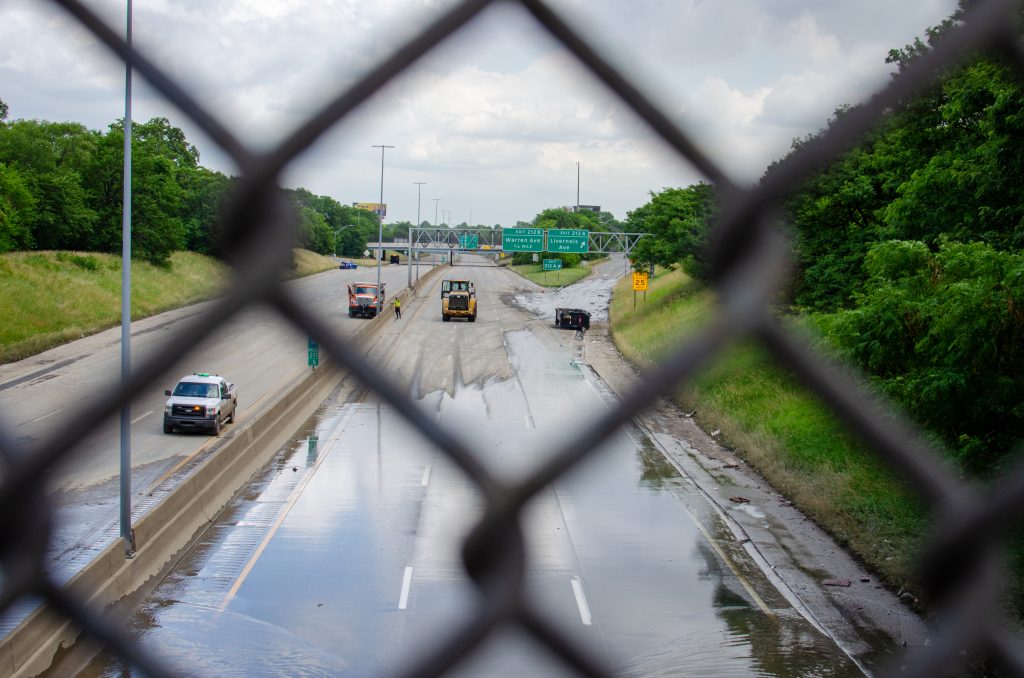Detroit Is Not Built to Handle Climate Change
University of Michigan climate scientist says infrastructure needs to be rebuilt for the worst-case scenario.

When flooding rains filled freeways and drenched basements across Metro Detroit in 2014, it was considered a 100-year flooding event.
It happened again over the weekend, with twice the normal amount of June rainfall happening within a few hours. Another heavy rain event is a certainty — and it’s likely it will be worse.
Jonathan Overpeck is the Dean of the School for Environment and Sustainability at the University of Michigan. He says the warming of Earth’s atmosphere will make once-uncommon weather events the new normal.
“There are two things going on here: One is certainly climate change making the problem worse. And the second thing is our infrastructure wasn’t designed for climate change.” –Jonathan Overpeck, School for the Environment and Sustainability at the University of Michigan
“As the atmosphere warms up, it can hold more moisture. And when it rains, it can dump more moisture faster. And in the Great Lakes region, we’ve seen for over a 40% increase in the most intense precipitation. So this is a big event, the 2014 event was big. But we’ve had other floods around the Midwest that have been really notable and they’ve kept farmers from planting as early as they’d like. They’ve busted huge dams up in Midland area, releasing a lot of water and causing mayhem downstream as lakes gateway. So this is all related to climate change.”
He says climate change is exacerbating the problem and that aging infrastructure isn’t equipped to deal with today’s extreme weather.
“There are two things going on here: One is certainly climate change making the problem worse. And the second thing is our infrastructure wasn’t designed for climate change and the scale of the climate extremes that we’re getting today. So we have to do two things: We have to work hard to stop climate change, or else the events will just get worse and worse. The rainfall, the flooding, will get bigger and bigger,” he says.
Related: How to File a Claim, Clean Up Your Home and Get Help After Metro Detroit Flood
“But we also have to rebuild our infrastructure. And we’re talking roads, we’re talking buildings, we’re talking our power distribution — flood pumps weren’t able to get the water off the highways, because there was no electricity. We’re talking sewers and wastewater. We’re talking a lot of infrastructure that was designed decades ago, and not for climate change. So it’s simply being overwhelmed.”
However, we’re not even close to the worst-case scenario.
“We’ve already increased the extreme rainfall in the Midwest region in Michigan by over 40% due to climate change, and we’ve only had one degree Celsius of global warming,” he says. “If we let her rip, we could have several degrees Celsius of global warming. So multiply what we’ve seen this weekend or last summer, by four or five times. And that’s what you’d see if we don’t do something about climate change. The sooner we do something about climate change, the cheaper it will be to build resilient infrastructure.”
Listen: How our infrastructure is not built for climate change.
Trusted, accurate, up-to-date
WDET is here to keep you informed on essential information, news and resources related to COVID-19.
This is a stressful, insecure time for many. So it’s more important than ever for you, our listeners and readers, who are able to donate to keep supporting WDET’s mission. Please make a gift today.
